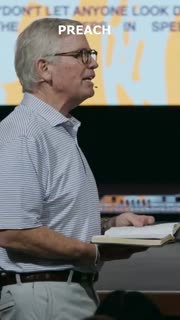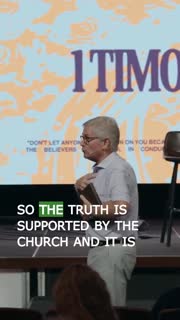Qualifications for Church Leadership: Living Out the Truth
Summary
### Summary
Today, we delved into 1 Timothy 3, focusing on the qualifications for overseers and deacons within the church. We began by understanding the context of Paul's letter to Timothy, emphasizing the importance of context in interpreting scripture. Paul describes the role of an overseer, or bishop, using the Greek term "episkopos," which means to look upon or oversee. This term is synonymous with "presbyteros" (elder) and "bishop," indicating that these roles are fundamentally about overseeing the church community.
We explored the qualifications for overseers, which include being above reproach, faithful to their spouse, temperate, self-controlled, respectable, hospitable, and able to teach. These qualities ensure that overseers lead by example, living lives that reflect the teachings of Christ. We also discussed the importance of not being given to drunkenness, not being violent but gentle, not being quarrelsome, and not being lovers of money. These attributes help maintain the integrity and spiritual health of the church.
Paul also outlines the qualifications for deacons, emphasizing similar virtues such as being worthy of respect, sincere, not indulging in much wine, and not pursuing dishonest gain. Deacons must hold the deep truths of the faith with a clear conscience, meaning they live lives free of guilt and shame, striving not to offend God or others.
The sermon concluded with a powerful reminder that the church, as the body of believers, is the foundation of truth. Our lives should reflect the truth of Jesus Christ, who lived, died, and was resurrected for our salvation. By living out these virtues, we support and uphold the truth of the gospel, demonstrating to the world that Jesus is alive and active in our lives.
### Key Takeaways
1. The Role of Overseers and Elders: Overseers, or bishops, are called to lead by example, living lives that are above reproach, faithful, temperate, and hospitable. Their role is to oversee the spiritual well-being of the church, ensuring that their conduct aligns with the teachings of Christ. This leadership is not about titles but about embodying the virtues that reflect God's character. [03:05]
2. The Importance of Being Above Reproach: Being above reproach means living in such a way that no accusation of wrongdoing can stick under examination. This doesn't mean being perfect but living transparently and with integrity. It’s about having a character that withstands scrutiny, thereby upholding the credibility of the gospel. [12:38]
3. The Virtue of Hospitality: Hospitality in the early church was crucial as it provided a means for believers to connect and support one another. Today, being hospitable means loving strangers and opening our lives to others, reflecting the inclusive love of Christ. This practice strengthens the community and spreads the good news of Jesus. [14:20]
4. The Danger of Loving Money: The love of money is a root of all kinds of evil. It can lead to greed and a closed heart, robbing us of the joy and freedom found in Christ. True stewardship involves recognizing that everything we have belongs to God and faithfully giving back to Him, starting with the tithe. [18:47]
5. The Church as the Foundation of Truth: The church, as the body of believers, is the pillar and foundation of truth. Our lives should reflect the truth of Jesus Christ, demonstrating to the world that He is alive and active. By living out the virtues outlined in scripture, we support and uphold the truth of the gospel, making it visible to those around us. [35:51]
### YouTube Chapters
[0:00] - Welcome
[01:34] - Understanding Context in 1 Timothy
[03:05] - Qualifications for Overseers
[04:44] - The Role of Bishops and Elders
[06:31] - Synonyms in Church Leadership
[08:12] - The Episcopos Style of Worship
[09:36] - The Presbyterian Style of Worship
[11:05] - Overseeing the Church
[12:38] - Being Above Reproach
[14:20] - The Virtue of Hospitality
[15:39] - Avoiding Drunkenness and Violence
[17:18] - The Love of Money
[18:47] - The Importance of Tithing
[21:57] - Managing One's Household
[23:27] - Not a Recent Convert
[24:58] - Good Reputation with Outsiders
[26:33] - Qualifications for Deacons
[28:01] - Holding the Mystery of Faith
[29:39] - Testing Deacons
[31:24] - Qualifications for Female Deacons
[32:56] - Faithfulness in Marriage
[34:31] - Serving Well as a Deacon
[35:51] - The Church as the Foundation of Truth
[37:29] - The Mystery of Godliness
[39:17] - Preaching Jesus
[40:54] - Invitation to Repentance
[42:32] - Closing Prayer and Baptism Invitation
Study Guide
### Bible Reading
1. 1 Timothy 3:1-13
2. Philippians 1:1
3. Acts 20:17, 28
### Observation Questions
1. What are the qualifications for overseers as outlined in 1 Timothy 3:1-7?
2. How does Paul describe the role of deacons in 1 Timothy 3:8-13?
3. According to the sermon, what is the significance of being "above reproach"? [12:38]
4. What does the term "episkopos" mean, and how is it used in the context of church leadership? [03:05]
### Interpretation Questions
1. Why does Paul emphasize the importance of overseers being "above reproach"? How does this impact the credibility of the gospel? [12:38]
2. How does the virtue of hospitality reflect the inclusive love of Christ, both in the early church and today? [14:20]
3. What are the potential dangers of loving money according to the sermon, and how can this affect one's spiritual health? [18:47]
4. How does the church serve as the foundation of truth, and what responsibilities do believers have in upholding this truth? [35:51]
### Application Questions
1. Reflect on the qualifications for overseers and deacons. Which of these virtues do you find most challenging to embody in your own life? How can you work on developing this virtue?
2. Being above reproach means living transparently and with integrity. Are there areas in your life where you need to be more transparent or act with greater integrity? [12:38]
3. Hospitality is about loving strangers and opening our lives to others. How can you practice hospitality in your daily life, especially towards those who are different from you? [14:20]
4. The love of money can lead to greed and a closed heart. How can you practice true stewardship and ensure that your heart remains open and generous? [18:47]
5. The church is the foundation of truth. How can your life better reflect the truth of Jesus Christ to those around you? [35:51]
6. Think about a time when you were tested in your faithfulness or commitment. How did you respond, and what did you learn from that experience? [29:39]
7. How can you support and uphold the truth of the gospel in your community, demonstrating that Jesus is alive and active in your life? [35:51]
Devotional
Day 1: Leading by Example
The role of overseers and elders in the church is not about holding a title but about embodying the virtues that reflect God's character. Overseers are called to lead by example, living lives that are above reproach, faithful, temperate, and hospitable. Their primary responsibility is to oversee the spiritual well-being of the church, ensuring that their conduct aligns with the teachings of Christ. This leadership is about serving others and guiding them in their spiritual journey, demonstrating the love and truth of Jesus through their actions and decisions.
Being an overseer means being a shepherd to the flock, caring for their spiritual needs, and protecting them from false teachings. It requires a deep commitment to personal integrity and a lifestyle that others can look up to and emulate. By living out these virtues, overseers help maintain the spiritual health and integrity of the church, creating an environment where believers can grow in their faith and relationship with God. [03:05]
1 Peter 5:2-3 (ESV): "Shepherd the flock of God that is among you, exercising oversight, not under compulsion, but willingly, as God would have you; not for shameful gain, but eagerly; not domineering over those in your charge, but being examples to the flock."
Reflection: Think of a leader in your life who exemplifies Christ-like virtues. How can you emulate their example in your own life and leadership roles?
Day 2: Living Above Reproach
Being above reproach means living in such a way that no accusation of wrongdoing can stick under examination. This doesn't mean being perfect but living transparently and with integrity. It’s about having a character that withstands scrutiny, thereby upholding the credibility of the gospel. When we live above reproach, we reflect the holiness and righteousness of God, making it clear to others that our faith is genuine and transformative.
Living above reproach involves being honest, trustworthy, and consistent in our actions and words. It means avoiding behaviors that could lead to scandal or bring disrepute to the name of Christ. By striving to live above reproach, we not only protect our own witness but also contribute to the overall health and reputation of the church. This commitment to integrity is essential for anyone in a position of spiritual leadership, as it sets the standard for others to follow. [12:38]
Titus 2:7-8 (ESV): "Show yourself in all respects to be a model of good works, and in your teaching show integrity, dignity, and sound speech that cannot be condemned, so that an opponent may be put to shame, having nothing evil to say about us."
Reflection: Reflect on your daily interactions and decisions. Are there areas where you need to improve to live above reproach? What steps can you take to align your life more closely with the teachings of Christ?
Day 3: Practicing Hospitality
Hospitality in the early church was crucial as it provided a means for believers to connect and support one another. Today, being hospitable means loving strangers and opening our lives to others, reflecting the inclusive love of Christ. This practice strengthens the community and spreads the good news of Jesus. Hospitality is not just about inviting people into our homes but also about welcoming them into our lives and hearts, showing them the love and acceptance that Christ has shown us.
Practicing hospitality involves being intentional about creating spaces where people feel valued and cared for. It means going out of our way to make others feel welcome, whether they are fellow believers or strangers. By doing so, we demonstrate the love of Christ in tangible ways, breaking down barriers and building bridges of understanding and compassion. Hospitality is a powerful tool for evangelism and discipleship, as it opens the door for meaningful relationships and spiritual growth. [14:20]
Hebrews 13:2 (ESV): "Do not neglect to show hospitality to strangers, for thereby some have entertained angels unawares."
Reflection: Think of someone in your community or church who might feel isolated or overlooked. How can you extend hospitality to them this week, making them feel welcomed and valued?
Day 4: Guarding Against the Love of Money
The love of money is a root of all kinds of evil. It can lead to greed and a closed heart, robbing us of the joy and freedom found in Christ. True stewardship involves recognizing that everything we have belongs to God and faithfully giving back to Him, starting with the tithe. When we prioritize money over our relationship with God, we risk falling into the traps of materialism and selfishness, which can damage our spiritual health and relationships with others.
Guarding against the love of money means cultivating a heart of contentment and generosity. It involves being mindful of how we use our resources and ensuring that our financial decisions align with our faith values. By practicing good stewardship, we acknowledge God's sovereignty over our lives and trust in His provision. This not only frees us from the bondage of materialism but also allows us to be a blessing to others, using our resources to further God's kingdom and support those in need. [18:47]
1 Timothy 6:9-10 (ESV): "But those who desire to be rich fall into temptation, into a snare, into many senseless and harmful desires that plunge people into ruin and destruction. For the love of money is a root of all kinds of evils. It is through this craving that some have wandered away from the faith and pierced themselves with many pangs."
Reflection: Examine your financial priorities and spending habits. Are there areas where the love of money has taken precedence over your relationship with God? How can you practice better stewardship and generosity?
Day 5: Upholding the Truth of the Gospel
The church, as the body of believers, is the pillar and foundation of truth. Our lives should reflect the truth of Jesus Christ, demonstrating to the world that He is alive and active. By living out the virtues outlined in scripture, we support and uphold the truth of the gospel, making it visible to those around us. This involves not only personal integrity and holiness but also a commitment to sharing the gospel and standing firm in our faith.
Upholding the truth of the gospel means being unwavering in our commitment to Christ and His teachings. It requires us to be bold in our witness, speaking the truth in love and living in a way that honors God. As the church, we are called to be a light in the darkness, pointing others to the hope and salvation found in Jesus. By living out our faith authentically and passionately, we help others see the reality of God's love and power at work in the world. [35:51]
1 Timothy 3:15 (ESV): "If I delay, you may know how one ought to behave in the household of God, which is the church of the living God, a pillar and buttress of the truth."
Reflection: Consider how your life reflects the truth of the gospel. Are there areas where you need to be more intentional in living out your faith? How can you be a more effective witness to those around you?
Quotes
1. "You, the church, us, the church, we are the foundation for the truth, that the world is looking at you and me to see if we will in fact live what we say we believe. And to the degree that we live what we say we believe is the degree to which the truth is supported on the foundation of our lives. People are watching you, looking at you, they're saying, is he really going to live like he says he believes? And if he does, then it just gives impetus to the fact that he is supporting the truth, that Jesus is alive and that Jesus has come to make his abode in my heart and my life." [35:51] (60 seconds)
2. "The love of money will rob you from a wonderful life. It'll steal from you. It'll destroy you. It'll make you greedy. It'll close your heart. It'll keep you from enjoying all the benefits of being a child of the King. And so I want to encourage you not to be a lover of money prove that you're not a lover of money by the giving what belongs to God back to him. That's all. That's all I'm saying. Turn to your neighbor and say, boy, I really used to like him. Well, you're going to like me again. I promise you." [21:57] (41 seconds)
3. "When we preach Christ, we preach that Christ lived, that he lived, that he was crucified, that he was dead, and that he was buried, and that he was resurrected from the grave. That resurrection is the cornerstone of our faith. We preach the resurrection of Christ because without the resurrection, there is no faith. There is no Christianity. And so we preach Jesus, him crucified, he lived, he died vicariously for us, he was raised from the dead, resurrected, and today he's alive. He's not dead. He's not some theory. He's not some theology. He's not some idol. He's a living being. And we worship him. We worship him. There's none like him. There's none like him." [39:17] (49 seconds)
4. "Christianity is not about the old you getting better. Christianity is about the old you dying. And it's not about the old you getting better. It's about the old you dying. I want to ask you, would you mind bowing your heads, closing your eyes? If you're here today and you're not right with God, and you'd like to make that step, turn your heart back to him. Nobody but me and God looking. If that's you, would you just raise your hand? I want to make that step. I want to turn my heart back to you. High as you can get it. High as you can get it." [42:32] (35 seconds)
5. "So the truth is supported by the church and it is the church who proves that the truth is the truth. And so it's outstanding here is the pillar in the ground of the church. So Paul's writing, he says, I'm writing you this so that you will be able to know how you ought to conduct yourself in the church. How should you conduct yourself? Holy, reverently, beyond reproach, a life that's temperate, proper, moderated, a life that's love strangers, hospitable, kind, gentle, willing to be forbearant to others." [37:29] (45 seconds)
6. "The Bible says that we ought to hold the mystery of the faith. That is that Jesus, our savior, uh, in that kind of manner, verse 10 says that deacons must first be tested. And if there is nothing against them, let them serve as deacons. Deacons must first be tested. What does that mean? Well, first comes the test. It's an assignment. Maybe you join a servant's team today. Maybe you, uh, you, uh, you join a small group today. And so whether you realize it or not, there's a test coming with that choice. The test is, are you going to be faithful in support of that team or that small group?" [29:39] (46 seconds)
7. "So if you're apt to teach, that means that not only you can teach accurately the Word, but you have some anointing that goes with it, some of God's presence that goes with it, some of God's life that goes with it. Verse 3, you're not given to drunkenness, not violent, but gentle, not quarrelsome, and not a lover of money. Verse 3, you're not given to drunkenness, not violent, but gentle, and not So here we go. We had temperate up above. We said that was sober, not mixed with wine. And now we're saying not given to much wine. Which is it? You're going to be temperate or not given to much wine. I think Paul's trying to make a point here wine can be a problem." [15:39] (41 seconds)
8. "So the idea here is that someone who is going to qualify as a overseer in the church has got to rule his household. Well, got to rule his household. Well, got to raise his children right. Got to raise and take care of the people that are part of his household. Well, all right. And so that's really important. And because that's the training ground of where you learn to rule in the church. So if you flunked out of the training ground, who's going to let you rule in the church? Answer is nobody. And so, so we want to pass that test. And, and, and, and take good care of our house. Put it first." [23:27] (47 seconds)
9. "And so the Bible says that we ought to hold the mystery of the faith. That is that Jesus, our savior, uh, in that kind of manner, verse 10 says that deacons must first be tested. And if there is nothing against them, let them serve as deacons. Deacons must first be tested. What does that mean? Well, first comes the test. It's an assignment. Maybe you join a servant's team today. Maybe you, uh, you, uh, you join a small group today. And so whether you realize it or not, there's a test coming with that choice. The test is, are you going to be faithful in support of that team or that small group?" [29:39] (47 seconds)
10. "And so it begins in verse eight, in the same way a deacon, the Greek word is diakonos. In the same way, deacons are to be worthy of respect, sincere, not indulging in much wine and not pursuing dishonest gain. There's the wine again. So worthy respect means a seriousness of purpose and self-respect and conduct. Sincere means you're not double-tongued. Don't say one thing to this person and another thing to that person. Don't say one thing to this person and another thing to that person. Not a gossip. Not indulging in much wine. So just in case you missed it in verse three above, here it is again." [26:33] (34 seconds)










